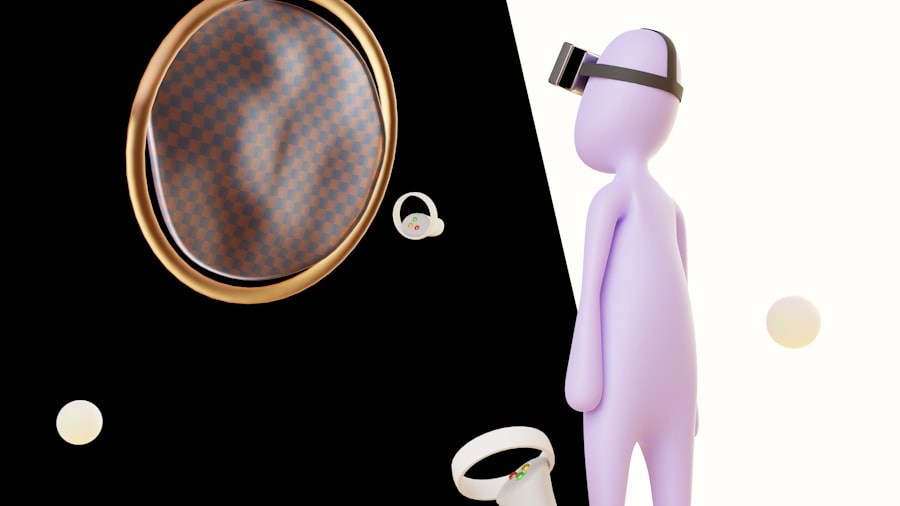Depersonalization and derealization are psychological phenomena that can leave you feeling detached from your own thoughts, feelings, or sense of self. When you experience depersonalization, it may feel as though you are observing yourself from outside your body, as if you are a spectator in your own life. This can lead to a profound sense of disconnection, making it difficult for you to engage with your emotions or understand your identity.
On the other hand, derealization involves a sense of unreality regarding your surroundings. You might perceive the world around you as strange, dreamlike, or distorted, leading to feelings of confusion and anxiety. These experiences can be unsettling and disorienting, often leaving you questioning what is real and what is not.
While they can occur in isolation, they frequently manifest together as part of a broader dissociative experience. Understanding these phenomena is crucial, as they can significantly impact your mental well-being and daily functioning. Recognizing the signs and symptoms can help you navigate these challenging experiences more effectively.
Key Takeaways
- Depersonalization is a mental health condition where a person feels detached from their own thoughts, feelings, and body, while derealization is a condition where a person feels detached from their surroundings.
- Symptoms of depersonalization and derealization include feeling like an outside observer of one’s thoughts or body, feeling like the world is unreal or distorted, and experiencing emotional numbness.
- Causes of depersonalization and derealization can include trauma, stress, anxiety, depression, and substance use.
- Diagnosing depersonalization and derealization involves a thorough evaluation of symptoms, medical history, and ruling out other potential causes.
- Treatment options for depersonalization and derealization may include therapy, medication, stress management techniques, and lifestyle changes.
Symptoms of Depersonalization and Derealization
The symptoms of depersonalization and derealization can vary widely from person to person, but they often share common threads. You might find yourself feeling emotionally numb or disconnected from your body, as if you are merely going through the motions of life without truly experiencing it. This emotional detachment can lead to difficulties in forming relationships or expressing feelings, leaving you feeling isolated and misunderstood.
In addition to emotional numbness, you may also experience cognitive symptoms such as memory lapses or difficulty concentrating. You might struggle to recall recent events or feel as though time is passing differently than usual. These cognitive distortions can exacerbate feelings of anxiety and confusion, making it challenging to navigate everyday situations.
Recognizing these symptoms is essential for understanding your experiences and seeking appropriate support.
Causes of Depersonalization and Derealization

The causes of depersonalization and derealization are complex and multifaceted. Often, these experiences are triggered by extreme stress or trauma, which can overwhelm your mind and lead to dissociative responses as a coping mechanism. For instance, if you have experienced a traumatic event, your brain may resort to depersonalization or derealization as a way to protect itself from the emotional pain associated with that event.
Additionally, certain mental health conditions can contribute to the development of these symptoms. Anxiety disorders, depression, and post-traumatic stress disorder (PTSD) are often linked with depersonalization and derealization. Substance use can also play a role; for example, the use of hallucinogenic drugs or alcohol can induce feelings of detachment and unreality.
Diagnosing Depersonalization and Derealization
| Metrics | Value |
|---|---|
| Prevalence | 1-2% of the population |
| Age of Onset | Usually in adolescence or early adulthood |
| Duration | Episodes can last for hours, days, months, or even years |
| Associated Conditions | Anxiety disorders, depression, trauma-related disorders |
| Treatment | Therapy, medication, mindfulness practices |
Diagnosing depersonalization and derealization typically involves a comprehensive evaluation by a mental health professional. During this process, you may be asked about your symptoms, their duration, and any potential triggers that may have contributed to their onset. It’s essential to provide detailed information about your experiences so that the clinician can make an accurate assessment.
In some cases, standardized questionnaires or diagnostic criteria from the Diagnostic and Statistical Manual of Mental Disorders (DSM-5) may be utilized to aid in the diagnosis. The clinician will assess whether your symptoms meet the criteria for depersonalization/derealization disorder or if they are better explained by another mental health condition. A thorough diagnosis is crucial for determining the most effective treatment plan tailored to your needs.
Treatment Options for Depersonalization and Derealization
Treatment options for depersonalization and derealization vary depending on the severity of your symptoms and their underlying causes. Psychotherapy is often the first line of treatment, with cognitive-behavioral therapy (CBT) being particularly effective. CBT helps you identify negative thought patterns and develop coping strategies to manage your symptoms more effectively.
Through therapy, you can work on grounding techniques that help you reconnect with your body and surroundings. In some cases, medication may be prescribed to address underlying mental health conditions contributing to your experiences. Antidepressants or anti-anxiety medications can help alleviate symptoms of anxiety or depression that may accompany depersonalization and derealization.
Coping Strategies for Depersonalization and Derealization

In addition to professional treatment, there are several coping strategies you can employ to manage depersonalization and derealization in your daily life. Grounding techniques are particularly helpful; these involve focusing on the present moment through sensory experiences. For example, you might try holding onto a textured object or listening to calming music to anchor yourself in reality.
Mindfulness practices can also be beneficial in reducing feelings of detachment. Engaging in mindfulness meditation or deep-breathing exercises can help you cultivate awareness of your thoughts and feelings without judgment. By practicing mindfulness regularly, you may find it easier to reconnect with yourself and your surroundings during episodes of depersonalization or derealization.
Impact of Depersonalization and Derealization on Daily Life
The impact of depersonalization and derealization on your daily life can be profound. You may find it challenging to engage in social situations or maintain relationships due to feelings of disconnection from yourself and others. This isolation can lead to increased anxiety and depression, creating a cycle that further exacerbates your symptoms.
Additionally, these experiences can interfere with your ability to perform daily tasks effectively. You might struggle with concentration at work or school, leading to decreased productivity and frustration. Understanding how these phenomena affect your life is crucial for developing strategies to cope with their impact while seeking support from friends, family, or mental health professionals.
Depersonalization and Derealization in Mental Health Disorders
Depersonalization and derealization are often associated with various mental health disorders, including anxiety disorders, depression, and PTSD. In individuals with anxiety disorders, these experiences may serve as a response to overwhelming stress or panic attacks. The feeling of detachment can provide temporary relief from intense emotions but ultimately contributes to a cycle of anxiety.
In cases of PTSD, depersonalization and derealization may arise as a way for the mind to cope with traumatic memories. The brain may dissociate from painful experiences as a protective mechanism, leading to ongoing challenges in processing emotions related to the trauma. Recognizing the connection between these phenomena and underlying mental health disorders is essential for effective treatment.
Depersonalization and Derealization in Trauma and Stress
Trauma and stress are significant contributors to the onset of depersonalization and derealization symptoms. When faced with overwhelming situations—such as abuse, accidents, or natural disasters—your mind may resort to dissociation as a coping strategy. This response allows you to distance yourself from the emotional pain associated with the trauma but can lead to long-term challenges in processing those experiences.
Understanding the relationship between trauma and dissociation is crucial for healing. Therapeutic approaches that focus on trauma-informed care can help you process past experiences while developing healthier coping mechanisms. By addressing the root causes of your symptoms, you can work towards reclaiming a sense of self and reality.
Depersonalization and Derealization in Substance Use Disorders
Substance use disorders can also play a significant role in the development of depersonalization and derealization symptoms. Certain substances—such as hallucinogens or alcohol—can induce feelings of detachment from reality or oneself during use. Additionally, withdrawal from substances may exacerbate these symptoms as your brain adjusts to functioning without them.
If you struggle with substance use alongside depersonalization or derealization symptoms, seeking help is crucial. Integrated treatment approaches that address both substance use disorders and mental health concerns can provide comprehensive support for recovery. By addressing both issues simultaneously, you can work towards achieving lasting healing.
Seeking Help for Depersonalization and Derealization
If you find yourself experiencing persistent feelings of depersonalization or derealization, seeking help is an important step towards understanding and managing these experiences. A mental health professional can provide guidance tailored to your unique situation, helping you explore underlying causes while developing effective coping strategies. Don’t hesitate to reach out for support from friends or family members who may understand what you’re going through.
Sharing your experiences with trusted individuals can alleviate feelings of isolation while fostering connections that promote healing. Remember that you are not alone in this journey; many people experience similar challenges, and support is available to help you navigate them effectively.
Depersonalization and derealization are complex psychological phenomena often characterized by a feeling of disconnection from oneself or the surrounding environment. These experiences can be unsettling and may lead individuals to question their sense of reality. For those seeking a deeper understanding of these conditions, an insightful article can be found on Unplugged Psych. This resource delves into the nuances of depersonalization and derealization, offering valuable perspectives and information. To explore this topic further, you can read more about it by visiting the following link: Understanding Depersonalization and Derealization.
LEARN MORE About Unmasking the Mysteries Behind Depersonalization and Derealization
FAQs
What is depersonalization and derealization?
Depersonalization is a mental health condition where a person feels detached from themselves, as if they are observing themselves from outside their body. Derealization is a similar condition where a person feels detached from their surroundings, as if the world around them is unreal or distorted.
What are the symptoms of depersonalization and derealization?
Symptoms of depersonalization may include feeling like an outside observer of one’s thoughts or body, feeling like one is in a dream, or feeling emotionally numb. Symptoms of derealization may include feeling like the world is artificial or colorless, feeling like one is in a fog, or feeling like objects are changing in shape or size.
What causes depersonalization and derealization?
Depersonalization and derealization can be caused by various factors, including trauma, stress, anxiety, depression, substance abuse, or certain medical conditions. It can also be a symptom of other mental health disorders such as dissociative disorders or post-traumatic stress disorder.
How are depersonalization and derealization treated?
Treatment for depersonalization and derealization may include therapy, medication, and lifestyle changes. Cognitive-behavioral therapy (CBT) and mindfulness-based approaches have been found to be effective in treating these conditions. Medications such as antidepressants or anti-anxiety drugs may also be prescribed in some cases.
Can depersonalization and derealization be cured?
While there is no specific cure for depersonalization and derealization, many people can experience significant improvement with proper treatment. It is important to seek help from a mental health professional if you are experiencing symptoms of depersonalization or derealization.




